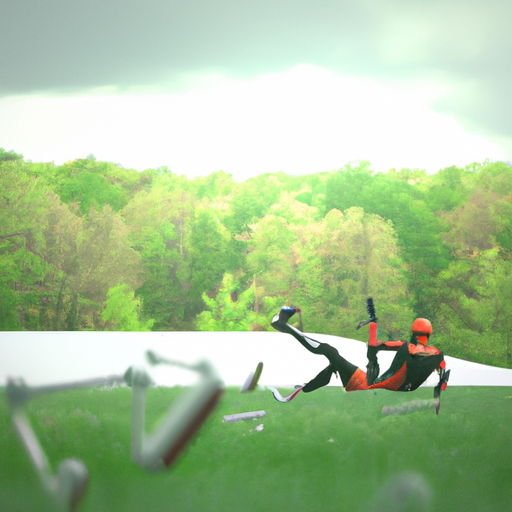When Injury Strikes: Navigating Sports Injuries and Recovery

Preventing Sports Injuries: Tips for Philippine Athletes
Sports injuries are a common occurrence among athletes, and they can be a major setback to their performance and overall health. In the Philippines, where sports are a significant part of the culture, it is essential for athletes to take preventive measures to avoid injuries. Here are some tips for Philippine athletes to prevent sports injuries and stay in top shape.
Firstly, it is crucial to warm up before any physical activity. A proper warm-up routine can help prepare the body for the demands of the sport and reduce the risk of injury. A warm-up should include stretching exercises that target the muscles used in the sport, as well as some light cardio to increase blood flow and raise body temperature. It is also essential to cool down after the activity to help the body recover and prevent muscle soreness.
Secondly, athletes should wear appropriate gear and equipment for their sport. This includes helmets, pads, shoes, and other protective gear that can help prevent injuries. It is important to ensure that the gear fits properly and is in good condition. For example, a helmet that is too loose or damaged can be ineffective in protecting the head from injury.
Thirdly, athletes should gradually increase the intensity and duration of their training. Overtraining can lead to fatigue, muscle strain, and other injuries. It is important to listen to the body and take breaks when necessary. Rest and recovery are just as important as training, and athletes should prioritize getting enough sleep and proper nutrition to support their physical activity.
Fourthly, athletes should pay attention to their technique and form. Poor technique can lead to injuries, especially in high-impact sports like basketball and volleyball. Coaches and trainers can provide guidance on proper technique and form, and athletes should practice regularly to improve their skills.
Lastly, athletes should seek medical attention for any injuries or pain. Ignoring pain or injuries can lead to more severe problems in the future. It is important to consult a doctor or physical therapist for proper diagnosis and treatment. Rehabilitation and physical therapy can help athletes recover from injuries and prevent future ones.
In conclusion, preventing sports injuries is crucial for Philippine athletes to stay healthy and perform at their best. By following these tips, athletes can reduce the risk of injury and stay in top shape. It is important to prioritize warm-up and cool-down routines, wear appropriate gear, gradually increase training intensity, focus on technique and form, and seek medical attention for injuries. With proper preventive measures, athletes can enjoy their sport and achieve their goals without the setback of injuries.
The Road to Recovery: How Philippine Athletes Can Bounce Back from Injuries

Injuries are an inevitable part of sports. No matter how careful athletes are, they can still suffer from injuries that can sideline them for weeks or even months. Injuries can be frustrating, painful, and can even end an athlete’s career. However, with the right mindset and approach, athletes can bounce back from injuries and return to their sport stronger than ever.
The road to recovery can be a long and challenging one, but it is essential for athletes to take the necessary steps to ensure that they recover fully and avoid re-injury. The first step in the recovery process is to seek medical attention immediately. Athletes should not try to tough it out or play through the pain, as this can worsen the injury and prolong the recovery time.
Once an athlete has received a diagnosis and treatment plan from a medical professional, they should follow it closely. This may include rest, physical therapy, or surgery. It is crucial for athletes to be patient and not rush the recovery process. Returning to sports too soon can lead to re-injury and further setbacks.
During the recovery process, athletes should also focus on their mental health. Injuries can take a toll on an athlete’s mental well-being, and it is essential to address any negative emotions or thoughts that may arise. Athletes can seek support from family, friends, coaches, or mental health professionals to help them cope with the challenges of recovery.
In addition to seeking medical attention and focusing on mental health, athletes can also take steps to prevent future injuries. This includes proper warm-up and cool-down routines, wearing appropriate protective gear, and maintaining good physical fitness. Athletes should also listen to their bodies and not push themselves too hard, as this can lead to overuse injuries.
For Philippine athletes, there are resources available to help them navigate the recovery process. The Philippine Sports Commission (PSC) provides medical and rehabilitation services to national athletes, including physical therapy, sports medicine, and injury prevention programs. The PSC also offers mental health support to athletes through its Sports Psychology Unit.
In addition to the PSC, there are also private sports medicine clinics and rehabilitation centers that athletes can turn to for specialized care. These facilities offer a range of services, including injury assessment, physical therapy, and sports-specific rehabilitation programs.
Ultimately, the road to recovery is a personal journey for each athlete. It requires patience, dedication, and a positive mindset. With the right approach, athletes can bounce back from injuries and return to their sport stronger and more resilient than ever before.
Mental Health and Sports Injuries: Coping Strategies for Philippine Athletes
Sports injuries are a common occurrence in the world of athletics. Whether you are a professional athlete or a weekend warrior, injuries can happen at any time. Coping with a sports injury can be a challenging experience, both physically and mentally. In this article, we will discuss the mental health aspects of sports injuries and provide coping strategies for Philippine athletes.
The first step in coping with a sports injury is to acknowledge the emotional impact it can have on an athlete. Injuries can be frustrating, disappointing, and even depressing. Athletes may feel a sense of loss, as they are unable to participate in the sport they love. It is important to recognize these emotions and allow yourself to feel them. Suppressing emotions can lead to further mental health issues down the road.
One coping strategy for athletes is to focus on the things they can control. While an injury may limit physical activity, it does not have to limit mental activity. Athletes can use this time to focus on other aspects of their sport, such as studying game film or learning new techniques. This can help keep the athlete engaged in their sport and provide a sense of purpose.
Another coping strategy is to stay connected with teammates and coaches. Injuries can be isolating, but staying connected with others can provide a sense of community and support. Athletes can attend team practices and games, even if they are unable to participate. This can help them stay connected with their sport and maintain a sense of belonging.
It is also important for athletes to seek professional help if needed. Injuries can take a toll on mental health, and it is okay to ask for help. Athletes can seek out a sports psychologist or counselor who specializes in sports injuries. These professionals can provide coping strategies and support during the recovery process.
In addition to coping strategies, there are also preventative measures athletes can take to reduce the risk of injury. Proper warm-up and stretching before physical activity can help prevent muscle strains and sprains. Wearing appropriate protective gear, such as helmets and pads, can also reduce the risk of injury.
It is important for athletes to listen to their bodies and take breaks when needed. Overtraining can lead to fatigue and increase the risk of injury. Rest and recovery are just as important as physical activity in maintaining overall health and preventing injury.
In conclusion, coping with a sports injury can be a challenging experience, both physically and mentally. It is important for athletes to acknowledge the emotional impact of injuries and seek out coping strategies. Staying connected with teammates and coaches, focusing on things within their control, and seeking professional help if needed are all effective coping strategies. Additionally, taking preventative measures and listening to their bodies can help reduce the risk of injury. By taking care of their mental health, athletes can recover from injuries and return to their sport stronger than ever.

